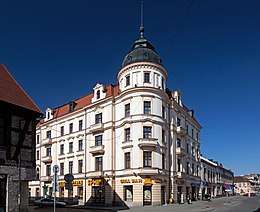Tomasz Pajzderski
Tomasz Pajzderski (16 February 1864 – 20 November 1908)[1] was a Prussian-Polish historicist architect.
Pajzderski was born in Jeżewo near Gostyń (then in Prussia, now in Poland). He completed gymnasium in Śrem and studied at Charlottenburg Polytechnic and École des Beaux-Arts. In 1895 he entered the Ministry of Public Works in Berlin, where he worked for three years before establishing his own architectural practice. He built tenement buildings (among others on Friedrichstraße) and small palaces in Berlin suburbs.[1][2][3] He also designed: the building of the Polish Association of Credit Cooperatives (1897–99, Związek Spółek Zarobkowych) in Posen (Poznań),[1] church in Kapuściany (1899), hotel "Bast" in Inowrocław (1900-1901),[1][2] churches in Jutrosin (1900-1902, funded by prince Zdzisław Czartoryski),[4][5] Czeladź and Ostrów.[2]
He moved to Warsaw in 1903 and was admitted professor of applied arts in Warsaw School of Fine Arts (1905-1907).[2]
His further works included: Mikołaj Szelechow's tenement house in Warsaw (1904, with Stanisław Grochowicz),[1] Church of Saints Simon and Helena in Minsk,[2][6] churches in Lubraniec (1905-1906)[3] and Grabów (built in 1907-1913, destroyed during the Second World War),[6] chappel and manor house in Fajsławice. He also worked on renovation of gothic church in Brześć Kujawski.[4][3]
He died in Warsaw and was buried at Powązki Cemetery. His brother Sylwester (1876-1953) was also an architect.[2]
Gallery
 Saint Stanislaus Church in Czeladź
Saint Stanislaus Church in Czeladź- The Red Church in Minsk
 Saint Elisabeth church in Jutrosin
Saint Elisabeth church in Jutrosin Church of Our Lady of Mt. Carmel in Lubraniec
Church of Our Lady of Mt. Carmel in Lubraniec Hotel "Bast" in Inowrocław
Hotel "Bast" in Inowrocław
References
- Wielka Encyclopedia PWN. 2005. Vol. 20. p. 171.
- Krystyna Konieczna. ”Czerwony Kościół w Mińsku”. Wiadomości Jutrosińskie. 108/2008. p. 3.
- Kazimierz Wyczyński. Architekt. January 1909/Issue 1. Kraków. pp. 13-14.
- Jerzy Żywicki. Architektura neogotycka na Lubelszczyźnie. Regionalny Ośrodek Studiów i Ochrony Środowiska Kulturowego w Lublinie. 1998. p. 105.
- Krzysztof Stefański. “Polish Ecclesiastical Architecture of the early 20th New Form and National Obligations.” Centropa: A Cournal of Central European Architecture and Related Arts. Vol. 3. 2003. p. 242.
- Andrzej Majdowski. Studia z historii achitektury sakralnej w Królestwie Polskim. Neriton. 1993. p. 37.